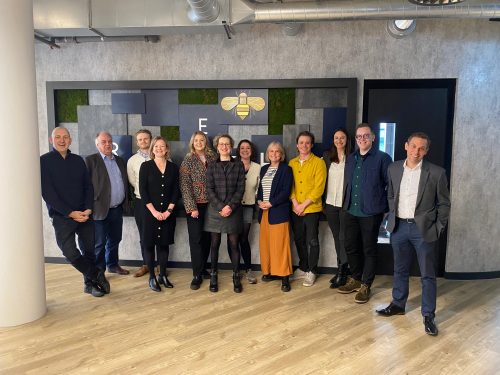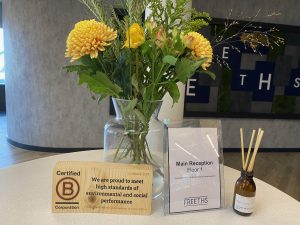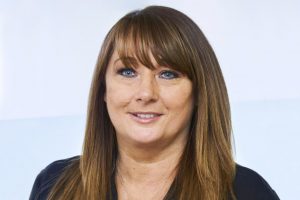To B, or not to B Corp – round table with Freeths on the road to B Corp

A lively round table discussion on B Corp certification and environmental, social, and governance (ESG) practices in business brought together leaders from a variety of sectors.
It was at the offices of law firm Freeths, which itself has recently achieved that status, one of the biggest UK law firms to do so.
The conversation revolved around the journey to B Corp certification, the challenges and opportunities of becoming a sustainable business.
Speakers shared their experiences and insights, emphasizing the importance of employee engagement, sustainability, and ESG factors in investment decision-making.
They discussed the difficulties and opportunities of obtaining B Corp certification, highlighting the lengthy and involved verification process, and the need for greater awareness and education about B Corp.

Freeths is a B Corp
Hannah Cox from the Better Business Summit, and consultancy Better Not Stop, described how the process that everyone has been through is constantly evolving, she said there was widespread debate amongst the B Corp community about how a division of a major multinational (Nespresso) could become a B Corp, while many other businesses owned by Proctor and Gamble “are doing bad things”.
“My kind of thought process is, when you’re looking at an assessment that’s looking at all industries or sectors all across the world, there are going to be some things that fall through the cracks, but we need to make the process a bit better. So the standards are going through the second stage,” she said.
Chris Freeston, a partner at law firm Freeths, introduced the firm’s journey to achieving B Corp certification around four months prior. He highlighted that gaining certification took 18 months and involved coordinating teams across the firm’s 13 offices. “There were a few things which felt like a blunt instrument We’re the tenant in our properties and we lost marks because we don’t manage our own wastewater.”
Josh Bean, an investor at the BGF investment fund, described their certification process which took around 18 months due to their smaller size compared to larger firms. “It was quite important for us to have something that held us accountable.”
He said BGF actively encourages portfolio companies to measure their progress against ESG objectives.
Malin Cunningham, founder of content agency Hatrick, discussed certifying after starting the business during the pandemic. “I listened to a podcast about B Corp and thought it sounded like a good framework.” The process helped identify strengths and areas for improvement.
Margaret Quinn shared that PR agency Social became a B Corp in July 2022 after 18 months of them formalising policies. “Formalizing all those policies was essential for us to get the call.”
Gordon Ker from restaurant group Blacklock said that his priority was about making their business a great place to work through B Corp certification, and attracting people with the same values. “We did it for our team internally, and the purpose that we can give our people.”
Jon Berry of environmental consultancy Tyler Grange highlighted how the certification process validated current work and identified a few underlying weaknesses. “There was tonnes of it. You know, we were making same mistakes of business.”
Sam Fazackerley discussed private equity firm Palatine’s certification journey which began in April 2021. “We felt it was the right thing to do. And it aligned with our values.”

Hannah Cox
Hannah Cox provided context around new B Corp standards with 10 sections and minimum expectations. Debate emerged around standards for the hospitality industry, which some feel face an additional burden.
Speakers discussed certification challenges including recognition of efforts, policy development, and data collection across sectors and supplier networks.
Donald Moore chairman of school uniform manufacturer and distributor One and All said there were hueg challenges for lower-wage jobs and sectors.
“Imagine what it will be like running a restaurant where you’ve got where 80% of the people are in traditionally lower paid jobs.”
Benefits of becoming a B Corp included validated impacts, accountability, decision-making rigour, and community engagement. Josh Bean said, “If we’re not holding ourselves accountable, how can we be holding our portfolio into account as well?” Margaret Quinn said she valued the Manchester B Corp network which hosts practical clinics.
Tender opportunities and investor interest were raised, with mixed experiences reported. Donald Moore asked investors if B Corps had an advantage, while Jon Berry questioned a lack of public sector recognition. “Why aren’t we getting that engagement at that level?”
Education and communication emerged as key themes. Malin Cunningham said, “People don’t know what they don’t know.” Hannah Cox suggested engaging local councils.
Speakers agreed all three ESG factors – environmental, social and governance – must be considered together for true impact. Helen Mitcheson said she found the social aspects “exciting and novel.”
The roundtable highlighted both progress and ongoing challenges for B Corps to address sustainability and inequality.
Sam Fazackerley, finance director at Palatine shared some insights on their journey to B Corp status.
“I think it has piqued some investors’ interests. And I think the investors show a lot more interest in ESG, than they did even 5 or 10 years ago. We get an awful lot of ESG questionnaires. And when they do their due diligence when they come into the fund, that is a big part of the questionnaire, but they’re not promising anything to us just for being a B Corp.
“What we do aligns with our values, and then we are able to provide the information that they need and demonstrate that.”
So while Palatine analyse their portfolio and create reports based on detailed measurements when they make their investments, especially related to ESG, she revealed that they also do the same when they exit and show how it’s improved.
And does that correlate with returns?
Diplomatically, she says: “I think it’s just too early to say.”
Josh Bean, an investment director at BGF agreed and said it’s just not enough to say investors have a commitment to ESG – frankly, everyone does that – and it’s just another business buzzword.
“You have to be able to walk the walk and have the empirical evidence behind it.
“So whilst I don’t think it’s implicitly adding value, I think in different areas where you can’t explicitly so to quantify it, the fact that you’ve applied that management rigour demonstrates that you have a more organised board, that there’s good governance structure which then just cascades into all aspects of the business,” he says.
“It’s correlation and causation, the management team that is interested in this stuff, will tend to have rigour throughout the organisation to track and make decisions to improve these things. They are also more likely to be the kind of teams that are organised in other areas and frankly, are just a better team.”








